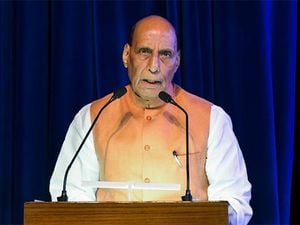Friedrich Merz, the leader of the Christian Democratic Union (CDU), is stirring significant political controversy as he pushes for stricter migration policies. Following the tragic knife attack in Ashaffenburg, which involved an Afghan asylum seeker, Merz has publicly argued for immediate legislative changes to address illegal migration effectively.
"The federal government has sworn to avert harm from the German people. What needs to happen for action to finally be taken?" Merz asked rhetorically during recent discussions. His statements are underpinned by mounting political pressure to respond to rising concerns about immigration and public safety.
Merz's proposals include permanent border checks, the rejection of asylum seekers at the border, and increased deportations. He stated during the ZDF show "Berlin direkt," "If the AfD agrees, they agree. If they don’t, let them abstain. There are no conversations, no negotiations, no joint government between us." This statement suggests Merz's intention to ally with any supporters, irrespective of their political affiliation.
The response to Merz's stance has been intense. Chancellor Olaf Scholz of the Social Democratic Party (SPD) criticized the potential constitutional violations inherent to Merz's proposals. "We always need to see what can be improved, but the basic law must never be undermined. I will not be part of it,” Scholz remarked, emphasizing the historical importance of asylum rights.
Scholz's assertions echo broader concerns from the SPD and the Greens, who worry about the consequences of compromising democratic principles by courting support from the far-right Alternative for Germany (AfD) party. "Do not put our democracy to the test," warned Felix Banaszak, chair of the Greens, outlining the potential threats to the democratic center represented by these actions.
Despite these warnings, public support for Merz's position appears surprisingly strong. A recent survey indicated 66% of Germans back the idea of rejecting illegal migrants and asylum seekers at all borders. Even among SPD voters, 56% expressed agreement with the proposed measures. The growing public concern over illegal immigration could be influencing these statistics significantly.
Merz continues to assert his commitment to pushing his migration agenda through, regardless of whether it gains the support of traditionally aligned parties. "I'm no longer willing to refrain from bringing forward what’s needed, just because the wrong people also agree with it," he stated, countering claims of moral complicity with the far-right.
Defending his push against the prominent backlash, he reflected on the necessity of his proposals. "This is really about making decisions now, especially after recent incidents," Merz emphasized, referring to the violent acts against innocent citizens as catalysts for urgent political action. His position may position him closer to voters concerned about safety but raises alarm bells within the political establishment.
Opponents fear this approach could lead to broader acceptance of right-wing agendas and potentially destabilize established political relationships. SPD Chairwoman Saskia Esken accused Merz of political blackmail: "By courting AfD support, he not only discards the Union's foundational principles but also sends dangerous signals to our European partners. Merz lacks the foresight required for true leadership."
Questions linger on the next steps. With Merz steadfastly announcing intentions to proceed with parliamentary votes over the upcoming length of the Bundestag session, analysts are assessing the potential fallout. The political ramifications of aligning with the AfD could alienate potential coalition partners from the Greens to the SPD, who are unwilling to support measures enacted with far-right backing.
Germany stands at a crossroads. With migration policies set to become pivotal during this election period, many are watching closely to see whether electoral calculus will drive the decision-making as debates around security and asylum heat up. Will the CDU under Merz forge new political pathways, or will it fracture under the weight of its choices?
Merz's navigation through the migration debate resonates strongly, with echoes of challenges faced by European political leaders amid rising nationalist sentiments across the continent. His attempts to seek common ground with other parties, especially after recent tragedies, suggest he believes there’s room for his agenda within the broader German narrative on migration.
Political experts are concerned about the precedent such tactics may set, pushing parties toward extreme positions to retain voter bases. With the specter of increased electoral competition looming, how Merz maneuvers his strategy could determine democratic stability and party alignment for years to come.
Only time will tell if Friedrich Merz can balance the urgent call for migration reform with the safeguarding of Germany's democratic traditions.



